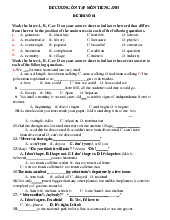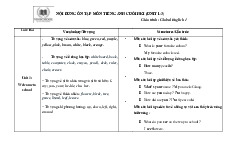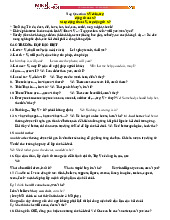













Preview text:
lOMoAR cPSD| 46836766
LE OF ACCOUNTING IN THE BUSINESS WORLD
In the realm of business, accounting plays a pivotal role as “language of business”. It offers
indispensable insights into a company's performance, ensuring compliance with statutory
requirements, and facilitating strategic planning through budgeting and future projections.
Firstly, financial records serve as a comprehensive reflection of a business's operations and financial
position. They aid in understanding the financial landscape, tracking expenses, determining gross
margins, and identifying potential debt. Up-to-date records enable comparisons with past accounting
data, facilitating informed decision-making and optimal budget allocation.
Secondly, accounting is indispensable for ensuring statutory compliance. Beyond internal
decisionmaking, accounting ensures statutory compliance, navigating the intricate landscape of
varying laws and regulations. From sales tax to income tax and pension funds, a robust accounting
system addresses liabilities methodically, safeguarding the business against legal challenges.
Thirdly, accounting plays a crucial role in creating budgets and future projections. The ability to plan
and project the financial trajectory of a business is fundamental to its success. Well-structured
accounting processes provide reliable historical financial data, which forms the basis for predicting
business trends and making informed decisions.
In essence, accounting is the comprehensive process of summarizing activities, interpreting financial
information, and communicating results to management and decision-makers. Its overarching goal is
to empower stakeholders with accurate and timely financial insights to make strategic business decisions.
WHY DO PEOPLE WANT TO BECOME AN ACCOUNTANT
In the realm of business, accounting plays a pivotal role as “language of business” so many people want to become accountants.
Firstly, accounting serves as the backbone of any organization and company. Through financial
analysis, budgeting, and strategic planning, accountants contribute significantly to the success and
growth of the entities they serve. Accountants play a crucial role in saving companies money by
minimizing tax liabilities and strategically managing payments to earn interest from banks. lOMoAR cPSD| 46836766
Secondly, the appeal lies in the diverse range of industries that accountants can engage with. From
public accounting firms to corporate finance departments, and even entrepreneurial ventures,
accountants have the flexibility to choose a niche that aligns with their interests. This variety not only
makes the profession dynamic but also allows individuals to continuously expand their skills and knowledge.
Lastly, many individuals pursue a career in accounting due to the perceived stability it offers. In an
ever-evolving business landscape, organizations require professionals who can navigate complex
financial landscapes and ensure compliance with regulations, making accountants indispensable
assets. This demand for financial expertise ensures a steady demand for accountants, creating a stable career path.
In conclusion, people aspire to become accountants due to the foundational role they play in
organizational success and the diverse career paths available. These factors make accounting an
attractive for individuals seeking a reliable career path.
WHAT MAKES A GOOD ACCOUNTANT
Accounting plays a pivotal role as “language of business” so many firms need good accountants. A
good accountant is an indispensable asset to any organization, possessing a unique blend of qualities
that go beyond number crunching.
Firstly, one key trait that defines a good accountant is ethics. Ethical conduct is the backbone of
financial reliability. An ethical accountant is honest, transparent, and committed to upholding the
highest standards of integrity. They use a moral compass to navigate the complex world of finance,
making decisions that stand the test of time.
Secondly, education plays a crucial role in shaping a competent accountant. A strong educational
foundation, including graduation in accounting, provides them with the necessary knowledge and
skills. In the modern era, being tech-savvy is also crucial. A good accountant is not only adept at
traditional accounting practices but also uses technology to increase efficiency. This skill allows them
to adapt to developing industries and the dynamic environment.
Thirdly, problem-solving abilities are necessary in the realm of accounting. In the world of numbers,
challenges often arise, requiring astute problem-solving abilities. A good accountant can solve lOMoAR cPSD| 46836766
complex financial puzzles, identify discrepancies, and formulate strategic solutions. Their analytical
mindset allows them to navigate intricate financial scenarios with precision.
In conclusion, a good accountant is an ethical guardian of financial truth, well-educated with a blend
of traditional knowledge and tech-savvy skills, and equipped with problem-solving prowess. These
qualities collectively ensure that they not only manage numbers but also contribute to the financial
health and ethical standing of the organizations they serve.
For accountants, effective writing skills can be as important as the ability to crunch numbers. Your
professional development and competitive edge depend as much on your ability to communicate what
you've found as the findings and recommendations themselves.
So what are some of the key writing challenges accountants face when trying to do this?
In the world of accounting, effective writing skills can be as important as the ability to crunch
numbers. While number crunching is still an important skill, effective communication raises an
accountant's professional standing. However, this journey is not devoid of challenges.
Firstly, explaining and presenting research is a difficult task. Accountants often struggle with
translating complex financial terms into simple language. The challenge lies in reducing complex
findings to digestible nuggets for clients, colleagues, or stakeholders. Simplifying without losing
accuracy requires both technical knowledge and linguistic skill.
Secondly, accountants must assume the role of persuaders and influencers. Numbers alone may not be
enough to persuade decision-makers. Writing or making a persuasive argument to support
recommendations involves the skill of emotionally connecting with the audience. This requires
accountants to improve their storytelling skills in order to bring the numerical story to life..
Lastly, the varied audiences pose another writing challenge. Accountants serve a diverse range of
stakeholders with varying backgrounds and levels of expertise. The ability to communicate financial
insights to a non-specialist requires accountants to understand the needs of different audiences and
adjust their language and tone accordingly.
In essence, accountants extend beyond the realm of numbers into the art of wordsmithing. Taking on
challenges such as explaining research, persuading, and adapting to diverse audiences propels
accountants to new heights in their careers. lOMoAR cPSD| 46836766
Compare and contrast GAAP and IFRS
Generally Accepted Accounting Principles (GAAP) and International Financial Reporting Standards
(IFRS) are two important frameworks that guide how companies prepare their financial statements.
While they share common goals of providing reliable financial information, they have some key differences.
Firstly, GAAP is a detailed set of instructions for companies in the United States, laying out specific
rules and procedures to follow when preparing financial statements. On the other hand, IFRS serves as
a global language for businesses worldwide in over 110 countries, including those in the European
Union. This global reach makes IFRS a framework for companies with international operations.
Secondly, the philosophies behind GAAP and IFRS differ. IFRS is principle-based, which means it
focuses on the generall concepts and guidelines while allowing for application flexibility. In contrast,
GAAP is more rule-based, providing explicit rules and detailed guidance for various accounting
scenarios. This can make GAAP more prescriptive in certain situations.
Thirdly, the order of assets is a notable distinction in the structure of financial statements. Under
GAAP, current assets take the spotlight at the beginning of the balance sheet, while IFRS starts with
non-current assets, showcasing a different approach to presenting financial information.
In essence, GAAP and IFRS are like two different languages in the accounting world. Despite these
distinctions, both frameworks share common goals of enhancing transparency and comparability in
financial reporting. The choice between GAAP and IFRS often depends on a company's geographic
location and the markets it operates in. lOMoAR cPSD| 46836766
In your experience, what do people think of the work done by accountants? What do they
generally think about financial statements? How can accountants make the numbers they
produce easier to understand?
Some folks think accountants simply crunch numbers and handle piles of paperwork, while others
appreciate the meticulous work they do in managing finances. The general perception of accountants
involves precision and trustworthiness, as they play a crucial role in keeping financial matters in order.
When it comes to financial statements, many people find them a bit like a mysterious code. They may
feel overwhelmed by the sea of numbers and unfamiliar terms. Some might view financial statements
as complex puzzles, making it challenging to grasp the true financial health of a company.
To make these numbers more digestible, accountants can take a few steps. First, they can use plain
language instead of using complex language. Breaking down complex concepts into simpler terms
helps people without a financial background understand better. Visual aids like charts and graphs can
also turn overwhelming numbers into clear patterns, making it easier for everyone to follow along.
Accountants can also provide context and explanations alongside the numbers, giving a storyline to the financial journey.
In essence, people generally respect accountants for their precision in managing finances. However,
there's room for improvement in making financial statements more accessible. Simplifying language,
using visuals, and providing explanations are key strategies for accountants to bridge the gap and
make the world of numbers more understandable for everyone. lOMoAR cPSD| 46836766
With the rise of artificial intelligence, a wide variety of professions are at risk of becoming
obsolete. So just what is the future of accounting?
The future of accounting is undergoing a transformation with the rise of artificial intelligence (AI),
and while some aspects of the profession may change, the role of accountants remains crucial in
navigating the evolving landscape.
Firstly, automation and AI are streamlining routine tasks in accounting, such as data entry and
reconciliation. This shift allows accountants to focus more on analytical and strategic aspects of their
work. Instead of spending hours on repetitive tasks, accountants can leverage AI tools to enhance
efficiency, accuracy, and decision-making.
Secondly, the emphasis is shifting towards developing advanced analytical and problem-solving skills.
AI can process vast amounts of financial data, but accountants are essential for interpreting the results,
providing insights, and making informed recommendations. The future accountant will need to be
proficient in data analysis, interpretation, and strategic thinking, working alongside AI to deliver valuable financial insights.
Lastly, the role of accountants is expanding beyond traditional financial reporting. With AI handling
routine tasks, accountants can take on more advisory roles, offering strategic guidance to businesses.
This involves understanding the broader context of a company's operations, identifying risks and
opportunities, and contributing to overall business strategy.
In conclusion, the future of accounting is not about replacing accountants with AI but rather about
reshaping their roles. Accountants will need to adapt by embracing technological advancements,
honing analytical skills, and transitioning into strategic advisors, ensuring they remain indispensable in an AI-driven world.
Differences Between VAS and IFRS
Accounting standards play a crucial role in maintaining financial transparency and consistency, but
not all standards are created equal. VAS (Vietnamese Accounting Standards) and IFRS (International
Financial Reporting Standards) are two prominent sets of standards with significant differences that
affect how businesses present and manage their financial information. lOMoAR cPSD| 46836766
Firstly, one significant dissimilarity lies in the appearance and structure imposed by these standards.
VAS meticulously dictates the form of various accounting elements such as the Chart of Account,
reporting templates, and ledger formats. For instance, VAS mandates specific account numbers like
111 for cash. In contrast, IFRS takes a more flexible approach. It doesn't impose a strict structure for
these elements, giving companies the freedom to tailor their accounting systems and forms to suit
their business characteristics. IFRS also provides a coherent conceptual framework and consistency
between standards, which is currently lacking in VAS.
Secondly, another key distinction emerges in the regulation of the Chart of Account. IFRS only
prescribes the format of financial statements under IAS 1, leaving the chart of accounts open for
customization by enterprises. This flexibility allows businesses to design their own account systems to
better align with financial statement requirements and internal management reports. However, this
autonomy can create challenges for foreign enterprises operating in Vietnam, as it sometimes leads to
difficulties in converting and maintaining consistency among companies within the same group.
Thirdly, the foundational principles and framework of accounting standards also differ between VAS
and IFRS. IFRS provides a robust conceptual framework that interconnects various standards,
ensuring a more seamless and comprehensive approach to financial reporting. In contrast, VAS faces
challenges with clarity and lacks a well-defined framework for both definition and consistency
between accounting standards. This distinction can impact the ease of application and interpretation
for businesses adhering to these standards.
In conclusion, the differences between VAS and IFRS extend beyond the surface appearance to
encompass the flexibility in Chart of Account structures and the foundational framework. While VAS
imposes a more rigid structure, IFRS allows greater adaptability, promoting a dynamic and
customizable approach to financial reporting for businesses worldwide. Understanding these
distinctions is crucial for enterprises navigating the complex landscape of global accounting standards.
Taxation system is closely connected with the financial reporting requirements
The taxation system is intricately linked to financial reporting requirements, playing a pivotal role in
shaping how businesses communicate their financial status. The alignment of financial reporting with
tax regulations not only influences the calculation of taxable income but also plays a crucial role in tax planning and compliance. lOMoAR cPSD| 46836766
Firstly, tax regulations influence financial reporting standards. Companies must align their financial
statements with tax laws, ensuring accurate representation. This connection fosters transparency, as
discrepancies between financial reports and tax filings could raise concerns.
Secondly, financial reporting serves as a basis for determining taxable income. The figures presented
in financial statements significantly impact the amount of taxes a company owes. The accuracy and
completeness of financial reporting directly influence tax calculations, making it imperative for
businesses to diligently adhere to reporting standards.
Moreover, financial reporting aids in tax planning and compliance. Businesses leverage financial data
to strategically plan their tax obligations, minimizing liabilities within the legal framework.
Compliance with financial reporting requirements ensures that companies have the necessary
documentation to support their tax positions during audits.
In conclusion, the symbiotic relationship between the taxation system and financial reporting
requirements underscores the importance of accurate and transparent financial information.
Businesses navigating this interconnected landscape must prioritize adherence to both financial
reporting standards and tax laws to maintain credibility, foster accountability, and navigate the
complexities of the contemporary business environment. lOMoAR cPSD| 46836766
Compare taxation of Vietnam with taxation in the USA and the UK
Taxation systems vary across countries, reflecting economic priorities and social structures. A
comparison between the taxation systems of Vietnam, the USA, and the UK reveals distinct
approaches to revenue collection.
Firstly, in Vietnam, the income tax system is progressive, with different tax rates based on income
levels. However, the rates are relatively moderate compared to the USA and the UK. The United
States employs a progressive tax system, with higher-income individuals facing higher tax rates. The
UK also follows a progressive model, with multiple tax bands. The progressive nature in the USA and
the UK aims for a fair distribution of the tax burden, ensuring that those who can afford it contribute more.
Secondly, corporate taxation diverges significantly among the three countries. Vietnam maintains a
corporate tax rate that is relatively low, fostering a favorable environment for businesses. In the USA,
corporate tax rates underwent recent changes to enhance competitiveness, albeit still higher than those
in Vietnam. The UK, historically known for its moderate corporate tax rates, underwent reductions to
attract foreign investment and stimulate economic growth.
Thirdly, indirect taxes, such as value-added tax (VAT) or goods and services tax (GST), play a crucial
role in revenue generation. Vietnam employs a VAT system, while both the USA and the UK utilize
sales tax and VAT, respectively. The rates and applicability, however, differ. The USA lacks a federal
sales tax, with states setting their rates, while the UK applies a standard VAT rate on most goods and services.
In conclusion, while Vietnam, the USA, and the UK share the common goal of revenue collection,
their taxation systems differ in terms of rates, progressivity, corporate taxation, and indirect taxes.
Understanding these distinctions is vital for businesses and individuals navigating the unique financial landscapes of each country.
What responsibilities do auditors have in relationship with clients
Auditors play a pivotal role in ensuring financial transparency and reliability in the business world.
Their responsibilities extend beyond number-crunching; they are integral to maintaining trust in financial systems. lOMoAR cPSD| 46836766
Firstly, auditors are entrusted with the duty of verifying financial statements. This involves a
meticulous examination of the client's financial records, transactions, and accounting practices to
ensure accuracy and compliance with relevant regulations. By meticulously assessing financial data,
auditors contribute to the credibility of the information presented to stakeholders, such as investors and regulatory bodies.
Secondly, auditors must maintain independence and objectivity. To uphold the integrity of the audit
process, auditors need to remain impartial and free from any conflicts of interest. This independence
ensures that their assessment of the financial statements is unbiased and reliable. It also safeguards
against any potential manipulation or misrepresentation of financial information by the client.
Thirdly, auditors are responsible for identifying and reporting any irregularities or potential fraud.
They serve as watchdogs, scrutinizing financial activities to detect any signs of unethical practices or
discrepancies. This responsibility is crucial in safeguarding the interests of shareholders and the
public, as auditors act as a line of defense against financial misconduct.
In conclusion, auditors shoulder the critical responsibility of ensuring the accuracy and integrity of
financial information. Their commitment to verifying financial statements, maintaining independence,
and detecting irregularities contributes significantly to building and preserving trust in the business world.
Difficulties in applying IFRS to Vietnam
Applying International Financial Reporting Standards (IFRS) in Vietnam poses several challenges,
reflecting the country's unique context.
First of all, one significant hurdle is the shortage of skilled human resources adept in IFRS. The
complex nature of these standards demands specialized knowledge, and the lack of trained
professionals can impede the smooth transition. Human resource development becomes critical for an
easy transition to IFRS, ensuring accuracy and compliance in financial reporting.
Moreover, the integration of IFRS also requires a strong and technologically advanced infrastructure.
Many Vietnamese companies may lack the advanced technological systems required for seamless
IFRS implementation. The integration of sophisticated accounting software and reporting tools
requires significant investment, which may strain the resources of smaller businesses. lOMoAR cPSD| 46836766
Additionally, the transition to IFRS may be perceived as a time-consuming process. Adapting to the
new standards involves retraining staff, adjusting existing accounting practices, and ensuring
compliance with the complex IFRS guidelines. This transition period may lead to a temporary
decrease in productivity and efficiency, creating concerns about the perceived waste of time.
In conclusion, obstacles to implementing IFRS in Vietnam include human resources, technological
infrastructure, and concerns about the time required for a smooth transition. Overcoming these
challenges will require a concerted effort from both the government and businesses to make the
adoption of IFRS a more feasible and streamlined process for the Vietnamese business landscape. lOMoAR cPSD| 46836766
Accounting is more important than auditing
Accounting and auditing, though distinct, are equally essential components of financial management,
each playing a pivotal role in ensuring transparency, accuracy, and accountability within an
organization. Rather than believing that accounting is more important than auditing, it is critical to
recognize their interdependence and the distinct contributions they bring to the financial landscape.
Firstly, both accounting and auditing share a symbiotic relationship in establishing financial
reliability. Accounting is the systematic recording, classification, and analysis of financial
transactions, whereas auditing is the critical examination process that verifies the accuracy of these
financial records. Auditors serve as independent evaluators, providing unbiased evaluations of
financial information prepared by accountants. This collaboration ensures the credibility of financial
statements, boosting stakeholder confidence and assisting decision-making processes.
Secondly, auditing protects against fraud and mismanagement, thereby improving the integrity of
accounting practices. Auditors perform rigorous examinations to detect any irregularities or
discrepancies in financial records, serving as a check and balance mechanism. Without auditing, the
risk of financial malpractices and inaccuracies increases, putting stakeholders' trust in the financial
information provided by accountants at risk.
Lastly, the compliance aspect of auditing ensures that regulatory frameworks and accounting
standards are followed. While accountants are in charge of recording transactions and preparing
financial statements in accordance with established rules, auditors verify that this is the case. This
dual responsibility ensures that financial reporting adheres to legal and industry standards, thereby
reducing legal risks and promoting ethical financial practices.
In conclusion, arguing that accounting is more important than auditing ignores the two functions'
symbiotic relationship. Accounting serves as the foundation for effective financial management, while
auditing serves as the critical evaluation that improves the reliability and credibility of financial information.
Do you agree that accounting generates only costs lOMoAR cPSD| 46836766
accounting provides a comprehensive view of a company's financial health, encompassing revenues,
profits, and various financial metrics essential for decision-making and analysis. It is imperative to
recognize the multifaceted contributions of accounting to organizational success, not just about costs.
Firstly, accounting makes a substantial contribution to maintaining financial transparency. Through
accurate record-keeping and financial reporting, accounting ensures that stakeholders, including
investors and regulators, have a clear and truthful understanding of a company's financial health. This
transparency fosters trust and confidence, crucial for the sustainability of any business.
Secondly, accounting facilitates effective resource allocation. By tracking revenues, expenses, and
assets, accounting aids in identifying areas of efficiency and inefficiency within an organization. This
allows management to allocate resources wisely, optimizing operations and mitigating unnecessary
costs. The focus here is on efficiency and optimization, not merely on generating costs.
Thirdly, accounting is pivotal in compliance and governance. Regulatory bodies and legal frameworks
require businesses to adhere to specific accounting standards and practices. Through meticulous
adherence to these standards, accounting ensures that organizations operate within legal boundaries,
fostering a culture of compliance and ethical conduct. Moreover, proper accounting practices
contribute to good governance by providing a systematic framework for checks and balances,
reducing the risk of financial mismanagement or fraud.
In conclusion, accounting is not merely a generator of costs; it is a cornerstone of effective business
management. Its role in maintaining financial transparency, facilitating resource allocation, and
ensuring compliance and governance underscores its significance in supporting the overall success
and sustainability of organizations. Rather than being viewed solely as an expense, accounting should
be recognized as an invaluable investment in the foundation and longevity of a thriving business.
The Importance of Good Accounting and Auditing in Taxation
Taxation is a crucial aspect of any functioning society, providing the necessary funds for public
services and infrastructure. However, for the taxation system to work efficiently and fairly, it requires
good accounting and auditing practices.
Firstly, good accounting practices ensure transparency and accuracy in financial records. Properly
maintained financial records enable tax authorities to track income, expenses, and deductions lOMoAR cPSD| 46836766
accurately. When businesses and individuals maintain clear and organized accounts, it becomes easier
for tax authorities to assess and collect taxes correctly. This transparency reduces the possibility of tax
evasion and ensures that everyone pays their fair share.
Secondly, auditing plays a pivotal role in validating the accuracy of financial records. Regular audits
help identify discrepancies, errors, or fraudulent activities in financial statements. By detecting these
issues early on, tax authorities can take necessary actions to address them, ensuring the integrity of the
taxation system. Auditing serves as a checks-and-balances mechanism, instilling trust in taxpayers
that the system is fair and just.
Lastly, good accounting and auditing practices contribute to the efficiency of tax administration. With
accurate financial records and regular audits, tax authorities can streamline their processes, making it
easier to enforce tax laws and regulations. This efficiency reduces the burden on both taxpayers and
the government, fostering a more effective and equitable taxation system.
In conclusion, the integration of good accounting and auditing practices significantly enhances the
effectiveness and fairness of taxation. Transparency, accuracy, and efficiency are essential elements
that contribute to a well-functioning taxation system, ultimately benefiting society as a whole.




